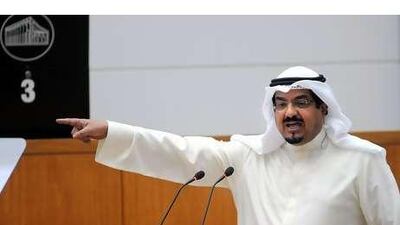Saad al Shuwaib, the architect of the failed US$17.4 billion (Dh63.9bn) K-Dow joint venture between Kuwait and the US company Dow Chemical, is to be replaced as the emirate's top oil executive. Kuwait Petroleum Corporation (KPC), the national oil conglomerate, will not renew Mr al Shuwaib's three-year contract when it expires next month, according to a local news report.
The industry veteran "has been verbally informed that he will not get a new term and that he will be sent into retirement", the Al Seyassah newspaper said, citing government sources. According to the newspaper, Sheikh Ahmad Abdullah Al Sabah, the Kuwaiti oil minister, will select a number of candidates for the chief executive's position, but the emirate's Supreme Petroleum Council will make the final nomination.
The council, headed by Sheikh Nasser Mohammed Al Sabah, the prime minister, is Kuwait's highest decision-making body on issues related to the country's oil industry. Mr al Shuwaib has had a rough ride at the helm of KPC. In June, 2007, he was brought in to shake up the company, which was not making progress with major projects that Kuwait's ruling Al Sabah family considered crucial to the national interest.
Those included a master plan, called Project Kuwait, to boost the emirate's oil production capacity by 48 per cent to 4 million barrels per day (bpd) by 2020. Three months later, Mr al Shuwaib's interim appointment was confirmed for a three-year term. Although it was not apparent at the time, he had accepted a mission impossible. Mr al Shuwaib had been promoted from another senior role as the chairman and managing director of the KPC petrochemicals unit Petrochemical Industries Company (PIC). By the end of the year, in what seemed a business coup for Kuwait, Dow had agreed to sell 50 per cent stakes in five of its global businesses to PIC for $9.5bn. The deal, if completed, would have been the emirate's biggest international investment.
"Through this joint venture, KPC enters a new arena of speciality products on leading global technologies," Mr al Shuwaib said at the time. "The [joint venture] will enable PIC to expand and diversify its international petrochemicals presence, while building on our long-standing relationship with Dow." The previous April, Dow had fired two executives it alleged had held secret talks with outside parties preparing an unsolicited bid for the company. The deal with KPC would make a hostile takeover more costly.
Dow, which already owned stakes in petrochemicals facilities in Kuwait, expected to complete the transaction by late 2008. In the meantime, it entered a $15bn deal to acquire the US speciality chemicals company Rohm and Haas. In November, amid tumbling oil prices, the K-Dow deal was renegotiated, with KPC signing a revamped agreement to pay $7.5bn for its share of the joint venture. The following month, however, Kuwait's government abruptly cancelled the deal as "unfeasible" in the deteriorating economic climate. That was after the agreement had been roundly criticised by Kuwait's elected parliament.
In a chain reaction, Dow's deal with Rohm fell through, Rohm sued Dow, and Dow threatened to sue Kuwait. Kuwait's parliament countered by appointing a committee to investigate "suspicions of profiteering and accepting all forms of commissions by oil executives" involved in the K-Dow negotiations. The committee's findings have not been made public and Kuwait has not disclosed the identities of the executives under investigation.
Dow vigorously rejected the bribery allegations. "With due respect to the internal events in Kuwait, the Dow Chemical Company is highly offended about any suggestion of improper actions," the company said in January last year. "The contract between Dow Chemical and Petrochemicals Industries Co (PIC) was entirely appropriate, as was Dow's conduct." The following month, Dow informed the US Securities and Exchange Commission that it had initiated arbitration proceedings against PIC over alleged breach of contract. It stopped short of launching a lawsuit that might have jeopardised an expected $1bn share purchase by the Kuwait Investment Authority.
Kuwait's parliament also opposed Project Kuwait, objecting to Mr al Shuwaib's plans for foreign participation in oil production. "Project Kuwait - an $8.5bn plan to utilise international oil companies to redevelop four fields covering 10 per cent of total reserves - remains stuck in a parliamentary committee after a decade in limbo," the Oxford Business Group said last year. Since 2007, KPC has succeeded in meeting a near-term goal of expanding crude output by 300,000 bpd to 3 million bpd this year.
But the company lacks access to advanced oilfield technology, and experts doubt it can manage much more. Other projects that went nowhere on Mr al Shuwaib's watch were a proposed joint venture with ExxonMobil to exploit Kuwait's technically challenging heavy oil deposits, and a plan to develop gas exports. Instead, Kuwait started importing liquefied natural gas last year under a deal with Royal Dutch Shell.
At least one stalled venture may be revived. The Supreme Petroleum Council is reviewing a $15bn refinery project after cancelling contracts for its construction last year. Members of parliament had alleged that at least one deal was awarded without a proper bidding process. tcarlisle@thenational.ae

